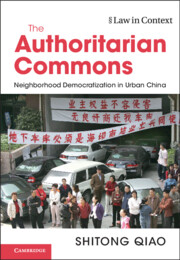Book contents
- The Authoritarian Commons
- Law in Context
- The Authoritarian Commons
- Copyright page
- Dedication
- Contents
- Figures
- Tables
- Acknowledgments
- Abbreviations
- Introduction
- Part I Theory
- Part II A Tale of Three Cities
- Part III Benefits and Risks
- Conclusion
- Appendix I: Summary of Research Methods
- Appendix II: Survey Data and Analysis
- Notes
- Bibliography
- Index
Conclusion
Democracy in China?
Published online by Cambridge University Press: 21 December 2024
- The Authoritarian Commons
- Law in Context
- The Authoritarian Commons
- Copyright page
- Dedication
- Contents
- Figures
- Tables
- Acknowledgments
- Abbreviations
- Introduction
- Part I Theory
- Part II A Tale of Three Cities
- Part III Benefits and Risks
- Conclusion
- Appendix I: Summary of Research Methods
- Appendix II: Survey Data and Analysis
- Notes
- Bibliography
- Index
Summary
Is the term “authoritarian commons” an oxymoron? No, it is not. It highlights the tension and interaction between homeowners and the authoritarian state. Total party-state control risks eroding party-state legitimacy simply through incompetence, whereas delegating service delivery to independent-minded middle-class residents can endanger party-state control. Overall homeowners appear to represent the best chance of democratizing urban governance in Chinese megacities. Homeowners’ associations have been a rare form through which Chinese citizens can get associated and have real elections recognized by law and respected by the government.
- Type
- Chapter
- Information
- The Authoritarian CommonsNeighborhood Democratization in Urban China, pp. 151 - 155Publisher: Cambridge University PressPrint publication year: 2025

